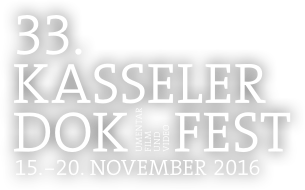The documentary feature film traditionally constitutes the center piece of the Kassel Dokfest. 57 films will be presented during this year's festival in the cinemas “Gloria” and “Filmladen”. This section shows documentary films with a total running time of more than 65 minutes; one focus lies on film productions from German-speaking regions.
The final program in 2016 has been selected from more than 500 feature film submissions. The criteria, which influence the selection, are the political, social and cultural relevance of the topics as well as the artistic handling of this topic in the submitted work. Next to more classical forms of presentation, the Dokfest is open for the introduction of innovative formats, which show alleged boundaries of the genre, the might and the power of manipulation of images. Furthermore low or no budget productions, works by up-and-coming artists as well as new projects of well-known filmmakers at the Kassel Dokfest receive special attention during the selection process:because accompanying documentary works-in-progress continually is as important to us as offering a platform for the perspectives of bold and extraordinary projects.
A viewing committee, consisting of five people with different professional backgrounds (since 2009), is responsible for the selection of this section. Next to their interest in the political and cultural happenings of the world and their curiosity towards courageous and unconventional (life) stories, this group of four is unified in a cinematic obsession for documentary film in all its topical and aesthetic forms as well as their pleasure in passionate discussion about the best documentary films for the Kassel film festival.
Every year the committee members take part in several national and international film festivals and other meetings of the film industry. Here the aim is to get an overview of the newest productions and foster contacts with filmmakers, before the main viewing process of the yearly submissions starts in the late summer months.
Obviously, the selection is only able to show a part of the increasing abundance of documentary work every year, trying to none-the-less cover a broad spectrum of topics and forms and reaching an equally broad audience during the festival days.
//
Have we lost all common sense? One may well be forgiven for thinking so, in light of the themes of a substantial component of this year’s more than five hundred film submissions. Forty of these full-length feature films will be presented over the course of the six festival days. They include true stories, incidents and events from around the globe and in combination create an impression that, behind all of those to whom we assign responsibility and blame, an invisible force is at work controlling the course of the world. If that were the case, it would be oddly convenient and relieving. However it is not the case. Rather it is the thoughts, actions and spirits of each and every individual that is shaping the course of history. Too much pathos? Too demanding? Rightly so!
How is it that an Indian mother has to investigate the death of her own child and ends up miserably failing (CECILIA)? How is it that a cruel massacre during the Kosovo War is carried out as a prearranged affair (DUBINA DVA)? How is it that, in the United States of America, traumatised ex-soldiers are left to fend for themselves (National Bird)? How is it that state-monitoring and the militarization of police is legitimised and symbolically forced, in the best interests of the armament industry? Is it because a display of social and community-orientated grievance is interpreted as a direct attack on democracy (DO NOT RESIST)?
Why do the members of an African indigenous people present the ugly face of western life? And why do historians, stockbrokers and politicians with great clarity explain the details of the deteriorating situation in Europe (GHOSTLAND, THE PREY – EUROPE UNDER PRESSURE)? Why is there such an urgent need for Philip Scheffner to show us a refugee boat for over 90 minutes, in combination with forceful off-screen narrative? Is it to remind us, once again, to listen and look (HAVARIE)?
Why is the arrival in a wealthy country, a country that, after all, promises safety and prospects, so difficult (TALES OF TWO WHO DREAMT, NO MAN IS AN ISLAND, DISTANT SONS)?
Why are we not fundamentally outraged about the practice of deportation and in the handling of the long-term unemployed by German authorities (DEPORTATION CLASS, THE JOB)?
Amid all the simmering, threatening situations of our times, do we really need to pay attention to stinking-rich actors, naked artists and a, though very musical, exceptionally despotic patriarch (THE GREAT FORTUNE, WHAT EVER HAPPENED TO GELITIN, THE WONDERFUL KINGDOM OF PAPA ALEV)?
Is it because these are all pieces of a large puzzle, spirits that shape our community? And are not discoveries of the relatively trivial also necessary in order to create dreams, ideas and hopes? In her portrait of a small Georgian town,Salomé Jashi succeeds in masterfully reminding us of the fascination of the commonplace and the potential for community (THE DAZZLING LIGHT OF SUNSET).
Ghosts move around us. Social practices, the striving for economic profit, and violent conflict are the products of active, thinking people. And it is valid to decode and question our own positions and the attitudes of others while acknowledging the curse and blessing of the information era (NOISE, IN LIMBO, A LEAK IN PARADISE). And because, directly or indirectly, we are all part of the story, it is valid to face the ghosts – not powerlessly, but attentively, curiously and actively.
Is it possible – in all seriousness and urgency – to maintain a certain ease? The ironic spectre of the, supposedly final, gentrification of Hamburg’s Schanzenviertel likewise delivers inspiration, as does the Rastafarian in Jamaica’s capital city Kingston (PHANTOM OF PUNK, KINGSTON CROSSROADS).
Download Program Schedule



